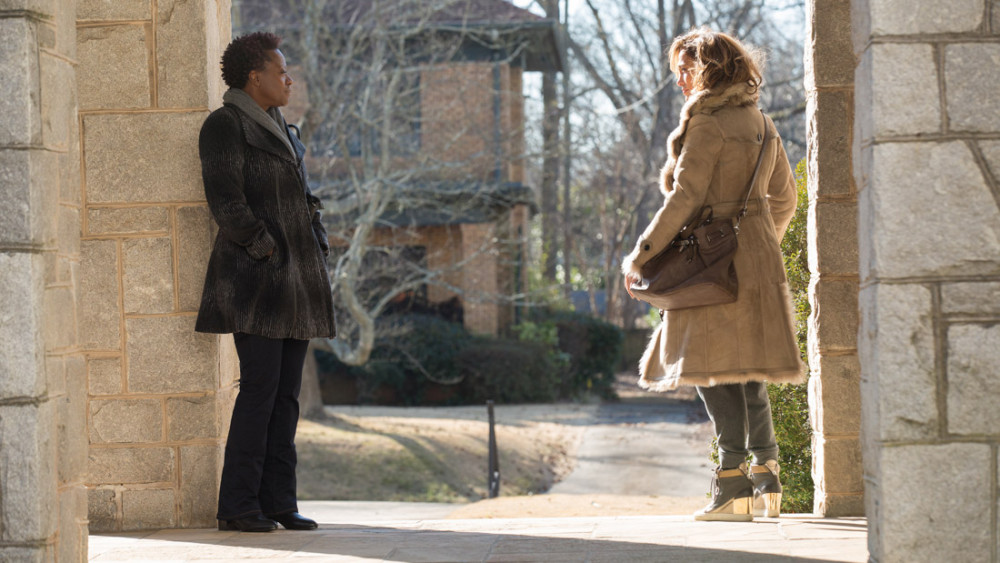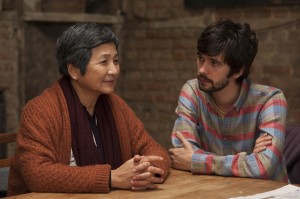
Lila and Eve doesn’t kick off nicely, with the immediate introduction being a woman’s son being shot down in the street, her grieving over the loss of her son, flashbacks emphasizing how much she regrets the way their relationship played out over the days before his death, and her being shown by cops that her son’s death means next to nothing to them. This woman is Lila (Viola Davis) and it isn’t until she meets Eve (Jennifer Lopez) at a support group that she realizes that maybe she can attain some semblance of serenity after her son’s death.
But serenity does not come through prayer for some, and that’s what this film explores. The women at the support group all say the kind of things someone grieving does and doesn’t want to hear to Lila: “You wanna hold him again.” “You want your son back.” “You want peace.” “You wanna hear his voice.” But only one voice, that of Eve, affects Lila in just the right way: “You want the ones responsible. You want them to know how it feels.”
Charles Stone III doesn’t miss a beat in setting the tone for his film: it’s dark and it’s sad, and it’s straight-forward in presenting the route it’s going to take from practically the moment these two women meet. Its color palette is limited to browns, muted oranges, and dark blues to reflect its mood, with occasional burst of color through lighting – like one particularly gorgeous looking and smartly played nightclub scene – not detracting from its dark tone. It’s tense, no doubt, and more drawn out than one might expect from a vengeance flick of this kind, as they usually speed on by without an ounce of introspection (of which there’s plenty here). Every close-up on Davis’ emotive face speaks mountains about her character and Lopez provides the perfect amount of punch for the film in a supporting role that gives her more to work with than she’s had in years.
This isn’t to say it doesn’t have its moments of levity as the titular characters get to know each other to counteract against the sheer mix of seriousness and ridiculousness that the plot implies; some work for the better of the film and some knock it all a little out of whack. Just as these two mothers decide to dive into tracking their son’s killers, Stone III cuts to a flashback in which Lila is sitting on the couch with a Netflix envelope saying, “Denzel’s on the trailer of a kidnapper in this one.” There’s self-awareness to be found within Lila and Eve, and that doesn’t detract from its strength as a revenge drama, a study of what grief can do to a person, and a commentary on the inefficiency of police when it comes to the lives of minorities.
What does, ever so slightly, take away from the strength of this film’s first two acts is a strange – but entirely predictable through the way DP Wyatt Garfield and Stone III shoot and block many of Lila and Eve’s scenes where the women interact – twist that’s thrown into the mix. It’s the kind of plot point that hampers a narrative that’s already working, but places emphasis on the way that people cope with grief in an atypical manner and doesn’t diminish just how cool these characters are. As flawed as Patrick Gilfillan’s debut script is though, the fact that it’s matched up with Stone III’s deft direction and two actresses who understand the heft of a narrative that places the vigilante narrative in the hands of women and empowers them makes it a hell of an interesting film to watch.
—
Directed by Charles Stone III; written by Patrick Gilfillan; starring Viola Davis and Jennifer Lopez; 94 minutes.
Lila and Eve is undergoing a limited theatrical release, is available for purchase on demand, and will be available on DVD/Blu-ray on August 25th.



 Derek
Derek
 Isabelle
Isabelle